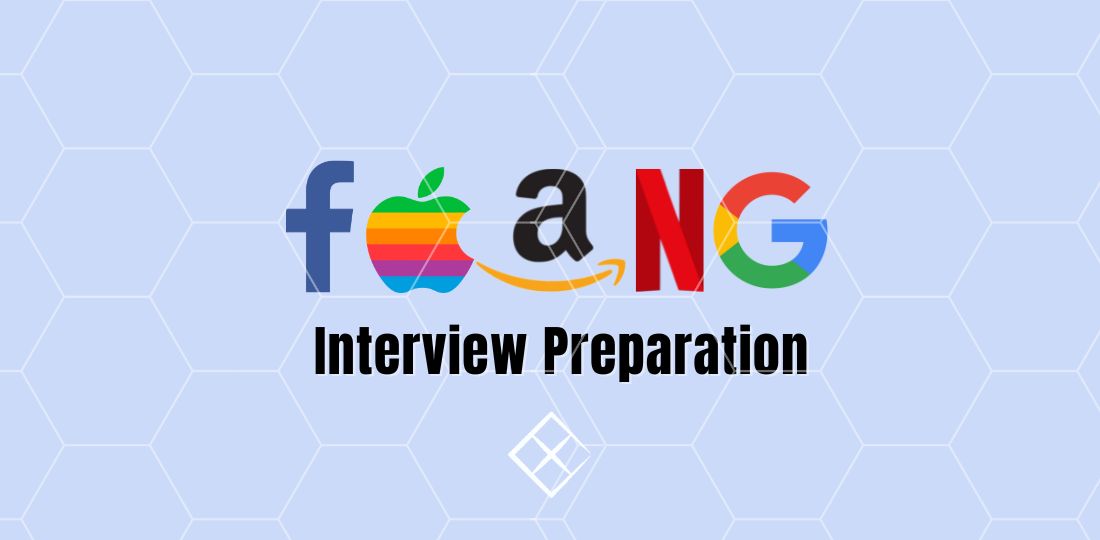- Published on
Cracking FAANG Interviews: Strategies and Trends
- Authors
- Name
- Rehber Moin
- @r3hbr

🚀 The Allure of FAANG
For software engineers, the FAANG companies—Facebook, Amazon, Apple, Netflix, and Google—represent the pinnacle of success. These companies offer not only lucrative salaries but also the opportunity to work on groundbreaking technologies that impact billions of lives. However, the road to landing a job at a FAANG company is highly competitive, and the interview process is known to be one of the toughest in the tech industry.
To crack the FAANG interview, you need more than just technical skills. The process involves multiple rounds that test your coding ability, problem-solving skills, and cultural fit with the company. So, how do you prepare to stand out in this highly competitive arena? Let’s break it down.

🎯 Key Skills for FAANG Interviews
Data Structures and Algorithms (DSA)
The foundation of FAANG interviews is your understanding of data structures and algorithms. Interviewers expect candidates to solve complex problems efficiently and correctly. Common topics include:- Arrays and Strings
- Linked Lists
- Stacks and Queues
- Trees and Graphs
- Dynamic Programming
- Recursion
A strong grasp of these concepts is essential, as they form the basis of most technical interview questions. Make sure to practice coding problems on platforms like LeetCode, HackerRank, or Codeforces to build your proficiency.
System Design
As you progress through your career, FAANG companies look for candidates who can design large-scale systems. System design interviews assess your ability to architect complex, scalable, and reliable systems. These interviews often focus on:- Designing a URL Shortener
- Designing a Social Media Platform
- Designing a Distributed Database
To prepare, familiarize yourself with key system design concepts such as load balancing, caching, and fault tolerance. Books like "Designing Data-Intensive Applications" by Martin Kleppmann and "System Design Interview" by Alex Xu are excellent resources to dive deeper into this topic.

Behavioral Interviews
FAANG companies not only evaluate your technical abilities but also assess whether you align with their core values and culture. Behavioral interviews are designed to evaluate how you handle real-world challenges, work in teams, and manage conflict. Expect questions like:- "Tell me about a time when you solved a difficult problem."
- "How do you handle tight deadlines and pressure?"
- "Give an example of a time you worked in a team to overcome a challenge."
The STAR technique (Situation, Task, Action, Result) is a great way to structure your responses to these questions.
🎯 Trends in FAANG Interviews
Focus on Problem Solving Over Memorization
In the past, many candidates focused on memorizing solutions to commonly asked interview questions. While this can help, FAANG companies now place more emphasis on problem-solving abilities. During interviews, you may be given a completely new problem that requires you to think critically and come up with a solution on the spot.So, don’t just memorize solutions—practice approaching problems from different angles, and focus on building your problem-solving mindset.
Online Assessments
Increasingly, FAANG companies are using online platforms to conduct initial coding assessments. These assessments are designed to test your coding skills and ability to solve problems within a time limit. Websites like HackerRank and Codility are often used for this purpose.Be sure to practice under time constraints, as these assessments are often designed to evaluate your speed and efficiency in addition to your accuracy.

Virtual and On-Site Interviews
FAANG companies have embraced virtual interviews, especially in the wake of the COVID-19 pandemic. During virtual interviews, you may be asked to solve coding problems using shared online coding platforms (like CoderPad or Collabedit). You may also be asked to participate in virtual system design or whiteboard interviews.On-site interviews typically involve multiple rounds with different interviewers, and you’ll be tested on both technical and behavioral aspects. Expect coding challenges on a whiteboard, system design interviews, and team-fit interviews where your interpersonal skills are evaluated.
🎯 Preparing for FAANG Interviews
Practice, Practice, Practice
Consistent practice is the key to success in FAANG interviews. Set a daily goal to solve coding problems and work on system design concepts. Build your problem-solving skills and practice thinking aloud during coding challenges. This will help you articulate your thoughts clearly during interviews.Don’t forget to time yourself! FAANG interviewers often focus on both speed and accuracy, so practicing under time constraints will help you feel comfortable with the pressure.
Mock Interviews
Take mock interviews with peers or use platforms like Pramp or Interviewing.io to simulate real interview conditions. Mock interviews are an excellent way to practice handling pressure and receiving feedback.Research the Company
Each FAANG company has its own unique culture and set of values. Research the company’s mission, vision, and recent innovations to tailor your responses to align with the company’s goals. Showing genuine interest in the company during the interview will help you stand out.

🌟 In Conclusion
Cracking a FAANG interview requires a combination of strong technical skills, problem-solving abilities, and a deep understanding of system design. By preparing for coding challenges, system design interviews, and behavioral questions, you’ll be well-equipped to tackle the rigorous interview process.
Remember, the interview process is not just about showcasing your technical prowess, but also about demonstrating how you fit within the company’s culture. Prepare thoroughly, stay calm, and most importantly—believe in yourself.
Good luck on your journey to FAANG! Whether you’re just starting your career or preparing for the next step, these tips will help you take your interview preparation to the next level.
